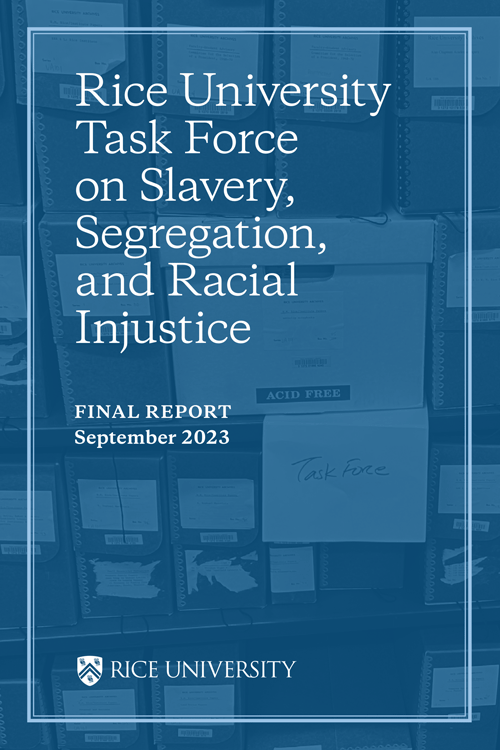 Rice University in Houston, Texas, has released its final report from the university’s Task Force on Slavery, Segregation and Racial Injustice. Led by Alex Byrd, vice provost for diversity, equity, and inclusion, and Caleb McDaniel, the Mary Gibbs Jones Professor of Humanities and professor of history, the task force formally began its work in December 2019.
Rice University in Houston, Texas, has released its final report from the university’s Task Force on Slavery, Segregation and Racial Injustice. Led by Alex Byrd, vice provost for diversity, equity, and inclusion, and Caleb McDaniel, the Mary Gibbs Jones Professor of Humanities and professor of history, the task force formally began its work in December 2019.
University founder William Marsh Rice was an oil and cotton tycoon, who when he died was said to be the richest man in Texas. He left the bulk of his estate to establish the Rice Institute for Literature. His will stipulated that only White students were allowed to enroll. From its founding in 1912 to 1965, no Black student was permitted to enroll. The university eventually won litigation allowing the educational institution to overrule the “Whites only” stipulation in its founder’s last will and testament.
The report includes the names of some of the people whom Rice enslaved or whose enslavement bolstered his business as a wholesale commission merchant, investor, and creditor within the cotton and sugar plantation economy of the Gulf South. Some of these enslaved people, such as Captain and Merinda, were recorded by name in historical documents because of their efforts to escape Rice’s control. Others are known by a name only because they appeared in deeds, probate documents, ledgers, and lists documenting mortgages, contracts, and transfers, including purchases of enslaved people.
The new report also includes the previously untold story of the Rice Institute’s history in Houston’s Fourth Ward, focusing on the property first intended for use as Rice’s campus grounds. In 1923, a never before acknowledged Ku Klux Klan event took place on Rice’s Louisiana Street property.
The document also examines the long struggle to integrate the university. White students’ opinions about racial integration remained divided throughout, as demonstrated by the inauguration, in 1960, of the Hanszen College Minstrel, an annual blackface show at homecoming that repeatedly mocked civil rights struggles well into the 1960s.
“We have conducted our work during a period of historic change at the university and beyond,” authors Byrd and McDaniel stated in the report. “What has not changed, though, is the vital mission of research universities like ours: to pursue knowledge freely for the betterment of the world, and to follow evidence wherever it leads — even when new evidence challenges conventional wisdom, and especially when the evidence exposes a university’s own errors.”

